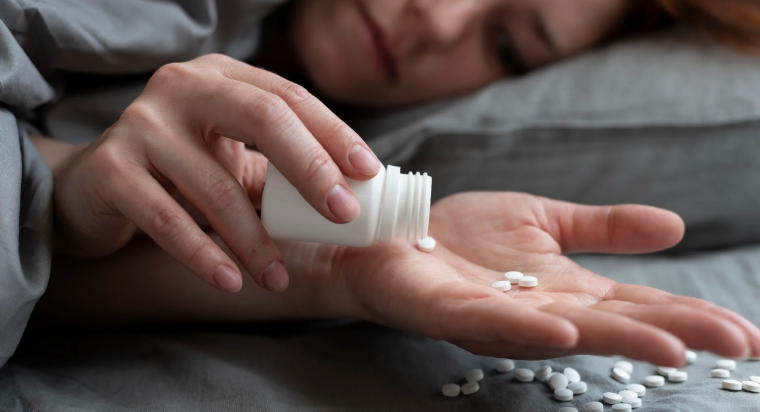Millions of people around the world struggle with sleep issues, especially poor sleep quality. When facing such troubles, many turn to sleep aids, both pharmaceutical and natural, for relief. But with so many options available, deciding on the ideal approach can be confusing.
With critical questions like: are sleeping pills better than natural sleep aids, do natural sleep remedies work, what can I do to sleep better etc. springing up on a daily basis, this article explores the pros and cons of both sleeping pills and natural sleep aids to help you make an informed decision about which might be best for you.
Are Sleeping Pills Better Than Natural Sleep Aids?
To get a better grasp of this, we will address both options separately.
- Sleeping Pills
EffectivenessPrescription sleeping pills can be highly effective in promoting sleep for short-term use. They work by altering brain chemistry to induce drowsiness and relaxation.Drawbacks
Side effects
Sleeping pills can come with a range of side effects, including daytime drowsiness, dizziness, headaches, and nausea. In some cases, more serious side effects like sleepwalking and dependence can occur.
Addiction
Dependence and withdrawal symptoms are major concerns with long-term use of sleeping pills. Your body can become reliant on the medication to fall asleep, making it difficult to sleep without it.
Interaction with other medications
Sleeping pills can interact with other medications you may be taking, leading to potentially dangerous complications.
Natural Sleep Aids
Types
There are various options to help you sleep naturally. Some common natural sleep aids include:
Melatonin
Melatonin is a hormone naturally produced in the body that regulates sleep-wake cycles. Melatonin supplements can be helpful for regulating sleep patterns and improving sleep quality.
Herbal remedies
Valerian root, chamomile, and lavender are commonly used herbs for promoting relaxation and sleep.
Relaxation techniques
Practices like meditation, yoga, and deep breathing can help calm the mind and prepare the body for sleep.
Benefits
Generally considered safer than sleeping pills, natural sleep aids typically have fewer side effects and pose a lower risk of dependence.
Drawbacks
Effectiveness
Natural sleep aids may not be as effective as prescription medications for everyone, especially in cases of severe insomnia.
Regulation
Natural sleep aids are often classified as dietary supplements, meaning their quality and dosage can vary significantly.
So, which is ideal?
The answer depends on your individual needs and circumstances.
For occasional sleep problems, consider trying natural sleep aids first, such as relaxation techniques, melatonin supplements, or herbal remedies.
For short-term insomnia, talk to your doctor about prescription sleeping pills if natural methods haven’t provided relief. However, be sure to discuss the potential risks and only use them as prescribed.
For chronic insomnia, consult a sleep specialist. They can help identify the underlying cause of your sleep problems and recommend the most appropriate treatment approach, which may not involve sleep aids at all.
Always talk to your doctor before taking any sleep aid, whether natural or pharmaceutical. They can help you weigh the risks and benefits and determine the best course of action for your individual situation.
In addition to the information provided in the article, here are some additional tips for promoting healthy sleep:
1. Maintain a regular sleep schedule. Go to bed and wake up at the same time each day, even on weekends.
2. Create a relaxing bedtime routine. Wind down before bed with calming activities like reading, taking a warm bath, or listening to soothing music.
3. Make sure your bedroom is dark, quiet, and cool. Create a sleep-conducive environment that is free from distractions.
4. Avoid caffeine and alcohol before bed. These substances can interfere with sleep quality.
5. Get regular exercise. Physical activity can help you fall asleep faster and sleep more soundly. However, avoid strenuous exercise too close to bedtime.
If you’re struggling with sleep issues, don’t hesitate to seek help from our team of experienced sleep specialists at the Pulmonary Clinic of the Carolinas.
We offer a comprehensive range of diagnostic and treatment services to help you achieve restful sleep and improve your overall health and well-being. Schedule a consultation today and take the first step towards a better night’s sleep!




 Translate
Translate
